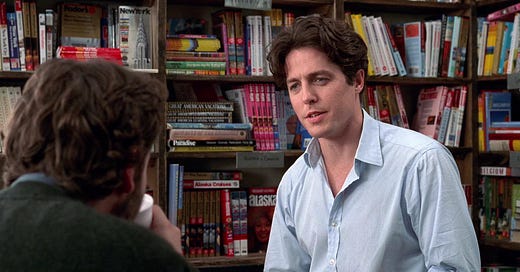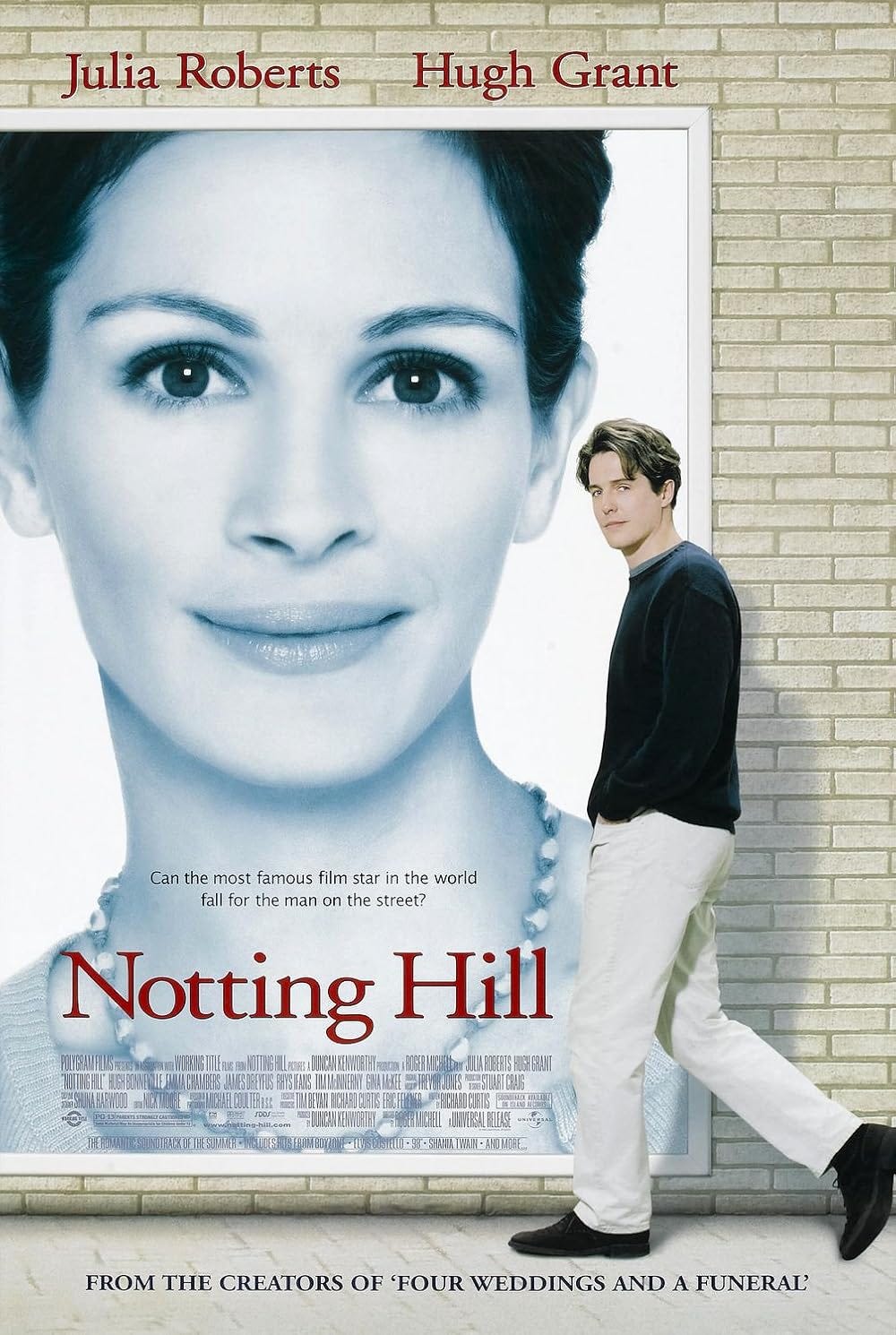Reader, we’re not really in the business of corrections or retractions with this newsletter. You get what you pay for here at Dust On The VCR.1 And that means unfiltered thoughts, opinions, and ramblings that will often beg revisiting in the future. That’s what we’ll be doing today, in a way.
Let’s rewind just over three years to a piece I wrote about The Umbrellas of Cherbourg, a film that’s lovely in many ways but not one that connected deeply with me. My mostly unserious take—prefaced though it was as “silly and trivial”—was that a town like Cherbourg, home to approximately 80,000 at the time of the film, simply doesn’t have the local economy to support a niche small business like an umbrella shop.2
That’s still true, of course. If I was Madame Emery, I simply would not have limited my wares to one item. But a few years later, I’ve come around a bit on the romantic nature of such a business endeavor—thanks in part to Notting Hill.
One of the signature romantic comedies of the 90s, Notting Hill succeeds largely because of the two lead performances. All due respect to Richard Curtis’s script, which is filled with nice set pieces and good dialogue.3 But if Julia Roberts wasn’t so talented and pretty and Hugh Grant wasn’t so charming and handsome and their chemistry together wasn’t so gosh darn palpable, you’d have a lesser movie.
That said, I love surface-level symbolism. And the bookstore where William Thacker (Grant) and Anna Scott (Roberts) meet is the film’s secret ingredient for me.
William’s line of work is one of the first things we learn about him. In fact, he and Anna have their delightful meet cute at his store. And it’s all very cleverly orchestrated. Before Anna shows up, Williams tells us via voice-over that his shop, the aptly but earnestly named “Travel Book Co.,” is a business that “sells travel books and, to be frank with you, doesn’t always sell many of those.” Already we know that he’s a happy-go-lucky romantic who followed his passion even though he’s barely making ends meet. And we instantly like that about him.
Anna shows up just a few minutes into the film, discreetly browsing the shelves. It’s unclear exactly what impulse drove her to pay this quaint little spot a visit; she flips through a few books, but she doesn’t seem to be searching for anything other than an excuse to be out of the public eye for a few minutes.
Or maybe, just maybe, she’s looking for love (in all the right places). And in just a few minutes, she sees enough from William to be intrigued—aside from his striking good looks, of course. Before he even speaks, she can safely assume that this man loves travel and literature so much that he’s built his livelihood around them. Much like Madame Emery’s umbrella shop, it’s not exactly a wise business investment, but it’s a romantic notion that one can make a living doing what they love, and it paints him as a genuine person. He even earns a few bonus points by handling a shoplifter with grace and a sense of humor, proving himself to be a kind but effective problem-solver.
But let’s dig a little deeper. Because there’s more symbolism to be mined from Anna’s transaction.
At first, though he recognizes there’s a movie star in his midst, William makes a direct attempt to help this novel new customer find a particular book. Just as any good small business owner would. But when she picks up a large hardback book about Turkey, he can’t help but try to spark a conversation once again: “Oh, that book’s really not great. Just in case, you know, browsing turned to buying.” He then recommends a different book about Turkey: a paperback that includes insights from a man who “has actually been to Turkey” along with some humorous anecdotes.
I’m not sure there’s any metaphorical significance to the nation of Turkey being the book topic here.4 But I do think their interaction holds some thematic weight. As the film shows us later on, there’s a bit of self-loathing to the William character. Which is perhaps why he’s single, living with a disgusting roommate, and working a dead-end job (even if it’s one he truly cares about). And perhaps that’s also why he unconsciously steers Anna away from him—to make sure that she’s just “browsing” and she doesn’t even consider anything beyond a fleeting attraction to him knowing that he can’t give her what she’s looking for.
But that’s what makes this comedy so romantic, innit?5 Anna decides she wants the large hardback travelogue after all, and William walks back his initial discouragement: “On second thought, maybe it’s not that bad after all. Actually, it’s sort of a classic, really.” And then as the film goes on and the two fall in love, browsing does turn to buying.
And the result is sort of a classic. All because one man believed in a niche but hopelessly romantic idea for a small business.
Notting Hill is now streaming on Netflix, and it is available to rent elsewhere.
Don’t worry, free subscribers, I’m still not gonna hit you with a paywall. (I deeply appreciate those of you who are paid subscribers, though!)
I mentioned in that piece, as I’ll mention again, the vacuum cleaner store in my hometown that hung on as long as it could and finally closed about a decade ago. (I’m honestly surprised they didn’t go out of business sooner.)
Do you know who Richard Curtis is married to, reader? Emma Freud—great-granddaughter of renowned psychoanalyst Sigmund Freud. I stumbled upon this weird fact while doing my half-assed Wikipedia research and couldn’t believe it. I hope she helps him write a screenplay.
Here’s my best attempt, though: Turkey is one of only a handful of countries that is part of two different continents. Maybe this is meant to represent Anna’s duality—as the film goes on to spell out for us, her public life and her private life are very different. How can one person (or one country) be two different things?
“Innit” is too good of a contraction for the Brits to keep to themselves, so I like to use it as often as I can.






I actually walked by it last week and uh, well thanks for opportunity to brag about that.
Masterful as per usual. Dang so glad you watched this. 5 out of 5 innits